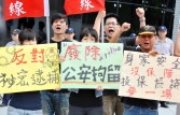
|
 Human rights in China: better if you’re a Taiwanese businessman? Human rights in China: better if you’re a Taiwanese businessman?
A new agreement between China and Taiwan on investor protection agreement is designed to encourage trade across the sometimes tumultuous strait.
But many in Taipei are more interested in whether the pact will provide physical protection for Taiwanese businessmen in China, particularly those who end up in detention.
The agreement signed on Thursday provides companies with ways to resolve disputes out of court through arbitration. It also addresses concerns over businessmen’s rights.
Many in Taiwan had been looking for a promise from China that it would provide notification within 24 hours of detaining someone and give detainees access to their family and lawyers.
Taipei is currently under pressure to help one of its nationals who has been detained on the mainland since June , according to Taiwan’s state media. The man is a member of the Falun Gong, a spiritual group banned in China. Supporters of him and others detained by Chinese authorities held protests outside the building where the agreement was signed (pictured).
China has also come under diplomatic fire for detaining executives from other countries, including four employees of Australia’s Rio Tinto mining group back in 2009.
Thursday’s agreement addresses the importance of protecting the physical safety of those travelling across the strait.
Implementation – specifying the 24-hour notification period and access to lawyers – is discussed in a separate document, dubbed a “common understanding”, that is not technically part of the official agreement.
“We will ask both governments to strengthen the notification system as soon as possible,” said Chiang Pin-Kung, chairman of Taiwan’s semi-official body for dealing with mainland China, at a press conference after the signing of the agreement.
However, part of the difficulty in getting such guarantees into the agreement, point out businessmen and lawyers in Taipei, is that China does not guarantee its own citizens such protections. Getting Beijing to grant them to Taiwanese citizens first was always going to be a challenge.
(2012-08-10/beyond-brics)
|





